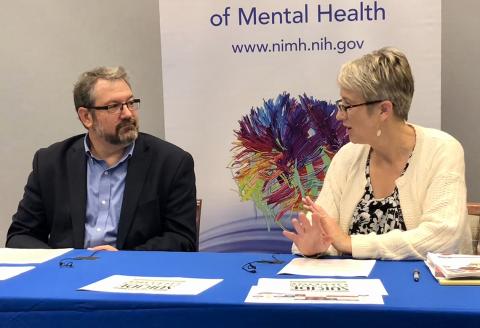Live Event
NIMH Addresses Strategies for Suicide Prevention

Photo: NIMH
What should you do if you are concerned a loved one may be thinking about suicide? According to National Institute of Mental Health director Dr. Joshua Gordon, “the most important thing to do is to ask.”
This message was among many that Gordon shared during NIMH’s Facebook Live event held in recognition of Suicide Prevention Week. The social media forum engaged members of the public in a conversation about suicide prevention and highlighted how NIMH-supported research is furthering knowledge that will help save lives and help reverse the rising suicide rates in the U.S.
“Suicide claims nearly 45,000 lives a year in our country, and we urgently need better prevention and intervention strategies,” said Gordon. “Thanks to research efforts, it is now possible to identify those at risk using evidence-based practices, and there are effective treatments currently being tested in real-world settings. This forum was an opportunity to share these interventions with a broad audience.”
Gordon was joined by Dr. Jane Pearson, chair of the Suicide Research Consortium in NIMH’s Division of Services and Intervention Research. Together, they fielded a variety of questions including how to identify and help individuals at risk for suicide and how to find resources to support those in need.
Many of the questions from the public focused on how to support and talk with someone you think may be having suicidal thoughts. Gordon and Pearson explained that you can ask someone directly “in a caring and supportive way” if they are thinking of killing themselves. They addressed the common misconception that asking someone if they are thinking of harming themselves will put that individual at greater risk.
Thoughts of suicide don’t go away if you don’t ask about them, Pearson indicated. She explained that it is much better to understand what is going on with someone, and if needed, help them find professional care through services like the National Suicide Prevention Lifeline (1-800-273-8255). They shared that research shows that straightforward and cost-effective interventions, such as safety planning with a health care provider and caring communications following a health care visit, can help those in crisis.
Gordon and Pearson also relayed the importance of talking about suicide in health-care settings. For example, the NIMH-supported Emergency Department Safety Assessment and Follow-up Evaluation (ED-SAFE) study found that asking everyone who visits emergency department settings if they are having suicidal thoughts or feelings almost doubles the number of individuals identified as at risk for suicide. They described NIMH efforts to create tools used to screen for suicide, such as the Ask Suicide-Screening Questions (ASQ) screening tool to help health care providers identify children and adolescents at risk for suicide. The accompanying ASQ toolkit offers resources to help providers implement the ASQ and talk with parents about the importance of asking youth directly if they are having thoughts of suicide.
“We had a high level of engagement from the public with many insightful questions about how to prevent suicide,” said Gordon. “This event was a great opportunity to answer their questions and spread the word about how we can all make a difference addressing this critical public health issue.”
To learn about the warning signs of suicide, action steps for supporting someone in emotional pain and crisis helpline numbers, go to the NIMH Suicide Prevention webpage at https://www.nimh.nih.gov/health/topics/suicide-prevention/index.shtml. The archived Facebook Live event is available at https://www.nimh.nih.gov/news/media/2018/facebook-live-suicide-prevention.shtml.
